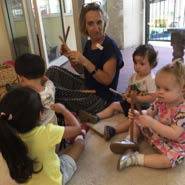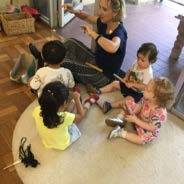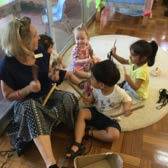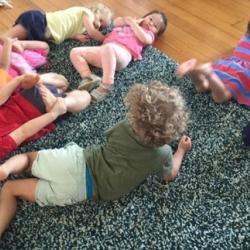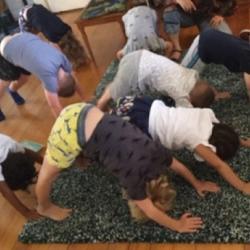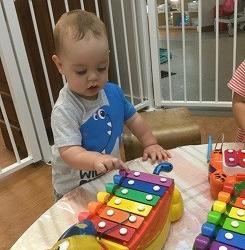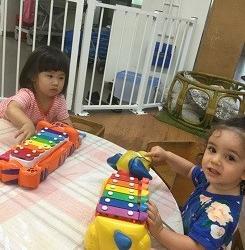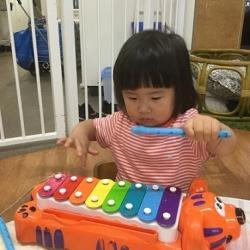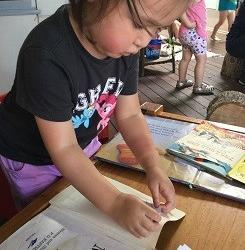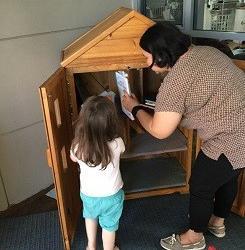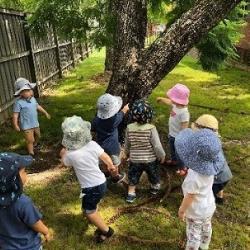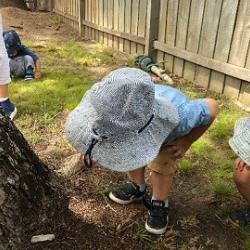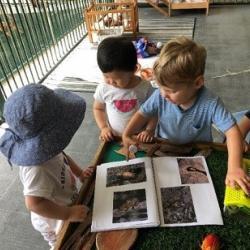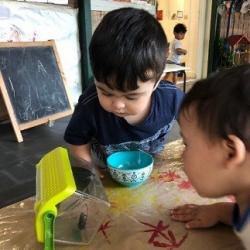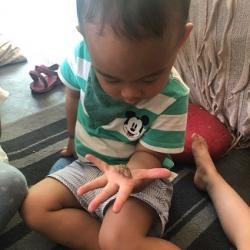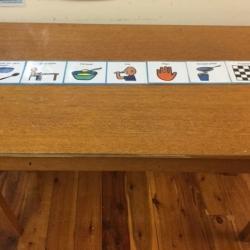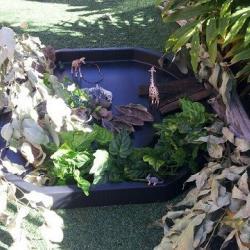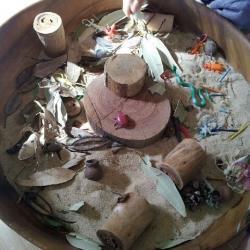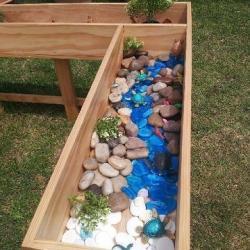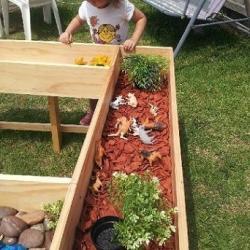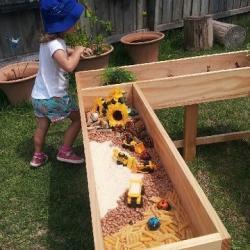Johnson House
Toddlers
‘Tap up High’
One day this week, after the children had explored all of our new learning spaces, they came together to sing and play the tapping sticks. The children continued to follow their interest in singing with the sticks from last week, and enjoyed singing ‘My sticks are tapping’ and ‘A-Ram-Sam –Sam’. We also practised some new songs ‘Tap up high’ and ‘One, two, tap your shoe’. The children were very eager to use the sticks to do some new movements and to make loud and soft sounds. As the children participated in the experience they were continuing to facilitate their co-ordination and to develop and learn music concepts such as loud/soft, high/low and rhythm and beat. What’s next? The children can continue to choose to participate in singing and music experiences as they are planned for daily in our program.
Preschool
The children have been given the opportunity to do yoga in small groups throughout the day. This has been well received by many of the children as they begin to explore a range of yoga poses. Children derive enormous benefits from yoga. Physically, it enhances their flexibility, strength, coordination, and body awareness. In addition to this, their concentration and sense of calm and relaxation improves. Within Johnson House we will continue to implement a range of mindfulness techniques to promote the children’s wellbeing and sense of self.
Murray House
Babies
As the new children continue to settle into Murray House Infants, their interest in music experiences also continue to grow. ‘Twinkle twinkle little star’ is currently one of the children’s favourite rhymes to sing along to. They often request the educators to sing it again by saying “more!” or wiggling their fingers to symbolise the twinkling stars. It’s lovely to observe the children’s engagement throughout the song as they learn the words and move their bodies to do the actions. Singing and chanting nursery rhymes has many benefits for children’s learning and development, such as promoting early literacy and language skills. The children are also developing a sense of belonging, as well as their social skills as they engage in small group singing experiences.
Toddlers
This week, following up on last year’s project, the children in Murray House toddlers’ room, led by educator Alisa, worked on adding some books to our community library. An old doll house is being upcycled and turned into a storage space for the books. A discussion about the word “library” ensued, with children sharing their own experiences of visiting a library. Some have borrowed books from the library or have seen a street library near their homes. One child explained to her peers, “People get books from the street library and read it at home. They bring it back when they’re finished.”
Educator Alisa then explained that we are going to create our own library to share books with everyone at The Infants’ Home. Alisa showed them the stickers that Georgia has made for us to label the books, which says ‘Community Library – The Infants’ Home’. We hope that people who borrowed the books know where to return them, so that other children can take turns to read them too. The children excitedly offered to help to peel the stickers off and to stick them on each book. They also helped with arranging the books on the shelf.
Rigby House
The children in Rigby House have become very aware of the loud sound coming from the trees in our outdoor environment. After a little investigation we discovered that cicadas are making this sound.
We started going on ‘cicada hunts’, and to the children’s great delight we found cicada shells on the tree trunks. We also found live cicadas, which we placed in a bug catcher for close observation. Later we released the cicadas back into the garden. After our cicada hunts, the children examine the cicada shells closely and counted how many we collected. Our young Rigby scientists have discovered several facts about cicadas:
- Baby cicadas live in the ground,
- They leave their shells on the tree trunk,
- The cicada shells have ‘lots of legs’ and big eyes and must be handled gently or they will break
- Big cicadas have wings and can fly and live high up in the trees.
Rigby children ask to go on ‘cicada hunts’ daily, and we have made up a song which we sing as we look for cicadas. It goes like this … “We’re going on a cicada hunt, we’re going to find lots of them, what a very hot day!”
Robinson House
Mealtimes at Robinson House
At Robinson House, children and educators enjoy lovely nutritious food together in small groups at mealtimes. Sitting together in small groups of seven gives us time to connect with each other. We discuss what is on the menu and what has happened that morning. Often there are debates and negotiations about healthy options and which foods are yummy. Some children talk about the meals and foods they eat at home with their families. In the small groups educators also have an opportunity to model eating and talking positively about different foods. This is important because children learn by observing, listening and experimenting at mealtimes.
At The Infants’ Home we work collaboratively in an integrated team, and as part of this collaboration Emma, our amazing Speech Pathologist, created some ‘visuals’ for our mealtimes. These visuals outline the mealtime routine we follow at Robinson House, which helps the children to know what will happening next. This is important because we know that predictable mealtime routines help children feel more confident when trying new foods.
Our team has also been encouraging children to explore food by using their senses. Children are encouraged to look, smell, touch and taste different foods and textures. Many children at Robinson House enjoy this sensory exploration, and we are seeing an increase in the number of different foods that children are eating.
Family Day Care
‘Small world play’ provides an excellent opportunity for children to use their imaginations. Family Day Care Sydney Wide Educator Ebony set up an African waterhole for the animals to visit from the neighbouring jungle to have a drink and take a bath! A mini world can be created in a drawer or in a bowl as seen in the reptile and creepy crawly park where the children were engaged in hiding the insects from the snakes under the cover of the gum leaves. At Elaine’s family day care service the coastal mini world with sea creatures and different coloured pebbles provides a sensory stimulating experience as well as an opportunity for imaginative play that allows children to explore and make sense of the world around them.
